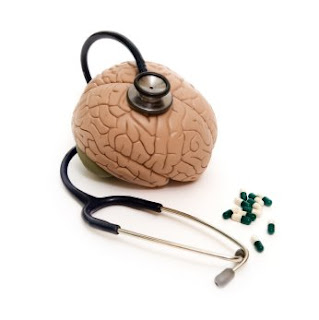6 Different Definitions of Treatment Resistant Depression
- Failure to respond to 1 adequate trial of an antidepressant
- Failure to respond to one or more adequate trials of antidepressants
- Failure to respond to 2 adequate trials of antidepressants
- Failure to respond to 2 adequate trials of antidepressants form different classes (e.g. SSRI and TCA)
- Failure to respond to 2 or more adequate antidepressant trials
- Failure to respond to 2 or more adequate antidepressants from different classes
Some authors and researchers object to the phrase failure to respond. They find this phrase blaming the patient. It is not the patients fault an antidepressant isn’t working or not working enough. Most of these researchers are authors of ECT publications. ECT is sometimes used as the last treatment option if antidepressants have failed. They prefer: pharmacotherapy treatment failure.
These six definitions were found in a systematic review of all randomized controlled trials on somatic treatment of treatment resistant depression. They found 233 references of which only 47 were RCT’s with unipolar depressed patients older than 18 years published in peer reviewed English Journals. Mostly publications about TRD is expert opinion on the subject. This publication is a systematic review.
In the majority of papers the information on the type of assessment for antidepressant resistance was not available. Two studies used a prospective assessment off TRD, 7 were retrospective assessed.
The majority of studies did not provide the maximum dose required to describe a previous treatment as a failure or success. 18 studies did not present information regarding requirements for prior treatment length.
Most studies did not use a thorough diagnostic evaluation, ideally performed with the use of a structured clinical interview, in case of treatment resistance.
A wide variety of terms has been used to decsribe TRD:
- treatment-resistant
- treatment-refractory
- therapy-resistant
There is still an absence of definitive consensus about a general suitable definition for TRD. There is also a lack of how to assess the presence of TRD.
So what needs done is an international consensus about what is TRD and how should we assess it.
Conclusions
There is a clear need for an internationally shared framework of concepts and methods for the investigation of TRD that could reduce current idiosyncrasies and provide a reference system. Such a foundation is essential for the interpretation of research findings and for their translation to clinical practice.
What are your thoughts about this subject, do you use a definition?
Related posts
One of my most read posts on this blog is:
9 Steps for Treatment Resistant Depression (TRD)
Genes and TRD
5 Features of Pseudoresistant Depression
![]()
BERLIM, M., TURECKI, G. (2007). What is the meaning of treatment resistant/refractory major depression (TRD)? A systematic review of current randomized trials☆. European Neuropsychopharmacology, 17(11), 696-707. DOI: 10.1016/j.euroneuro.2007.03.009

March 4, 2008 @ 3:58 am
I always wonder if a better term is “incorrect treatment depression”.
March 4, 2008 @ 11:13 am
Dear James,
Glad to “read” your back. Some authors also call it “medication
treatment failures according to the arbitrary ATHF standards”.
“Incorrect” would be to positive, it suggests that we always know what
antidepressants do to treat depression. We think we know what
antidepressants do in the brain and that these actions lift
depression. The last decades no effective new treatment options were
developed for depression, a lot of “me too” drugs came on the market,
we are still waiting for breakthroughs, but the pharmaceutical drug
companies keep putting most of their money in marketing instead of in research and development.
Regards Dr Shock
March 4, 2008 @ 10:32 pm
I always find it very difficult to believe it is not something I am doing wrong that causes my depression to be resistant to treatment. Some of it is the label “Treatment Resistant” and some of it is the definitions I hear most often…failure of one ore two medications, or classes of medications. I am so far beyond that, sitting at well over 30 medications tried alone and then in combination, or using other medications to augment responses. So when I hear one or two failures to respond I feel like I am beyond hope. “I” am failing to respond somehow.
…aqua
Potential surgical targets for deep brain stimulation in treatment-resistant depression | Dr Shock MD PhD
September 22, 2008 @ 6:45 am
[…] in the treatment of treatment resistant depression(TRD) in some small series and case reports. The definition of TRD is still a matter of debate. There isn’t one clear classification scheme of TRD. TRD […]
Vagus Nerve Stimulation, Does it Work? | Dr Shock MD PhD
November 12, 2008 @ 7:34 am
[…] makes placing VNS as alternative option for treatment resistant depression hard. Other alternatives are more evidence based: 9 steps for treatment resistant depression. This […]
Serious Adverse Events with DBS for Obsessive Compulsive Disorder | Dr Shock MD PhD
November 17, 2008 @ 6:36 am
[…] Deep Brain Stimulation for treatment resistant depression with stimulation of Broadman area 25 (Cg 25) no consistent declines in memory for either verbal or […]
rTMS Targeted with MRI Based Neuro-Navigation in Treatment-Resistant Depression | Dr Shock MD PhD
January 28, 2009 @ 11:46 pm
[…] of rTMS for treatment resistant depression isn’t impressive to say the least. The results of studies show little clinical relevance of […]
The placebo response of transcranial magnetic stimulation | Dr Shock MD PhD
June 4, 2009 @ 9:09 am
[…] The field of placebo response with the use of devices as treatment for major depression is hardly researched. Herb one of my very much appreciated readers and commenter asked me about the evidence on the placebo response to devices for major depression, didn’t have an answer. Tried searching but to no effect until recent. A lot of devices such as treatment with Transcranial Magnetic Stimulation (rTMS), Vagus Nerve Stimulation (VNS) and transcranial direct current stimulation (tDCS) are under study for the treatment of depression, mostly treatment resistant depression. […]